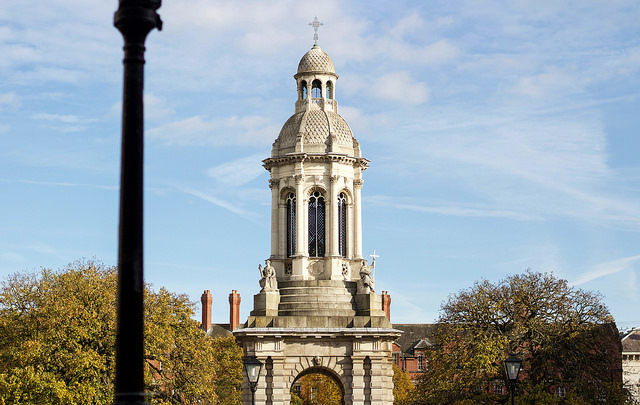It is widely recognised that College is facing a severe funding shortfall and has been for a number of years. The effects of this depletion of funds have been numerous and damaging. From a reputation point of view, Trinity has continuously slid down the rankings, falling from 61 in 2013/14 to the current position of 98 in the QS World University rankings. Although the subjective nature of rankings limits their veracity, the fall is unsurprising to most students and staff in the college.
For instance, College has sought to attract international students who pay higher fees. While the move to diversify the student body is welcome, it has also been accompanied by larger class sizes, worsening the student to staff ratio. Similarly, we have seen the complete removal of modules. In subjects like geography, such that students are not being offered the degrees they signed up for. Indeed, these problems that arise from a funding shortfall are not unique to Trinity.
Entrepreneurship in and of itself is well and good but it is worrying that it should become a core value of education
Addressing the falling standards in Irish universities, Provost Patrick Prendergast, in a joint statement with University College Dublin (UCD) President, Andrew Deeks, acknowledged that recent governments have “not sufficiently invested in Irish education”. The facts agree. Ireland is 29th out of 32 OECD countries on expenditure on third level education per student relative to GDP.
Pointing to solutions, the Provost has stated that “fees, philanthropy and commercial activity” will have to make up much of the future of the university. To date, commercialising the university has been a large part of College’s strategy to increase revenue. The effect of this is the growing corporatisation of the university. One such example is the development of an Innovation and Entrepreneurship Hub which has seen library space given over to accommodate the startup incubators Launchbox and Blackstone Launchpad.
Entrepreneurship in and of itself is well and good but it is worrying that it should become a core value of education, to the extent that the Provost has declared that “entrepreneurship is becoming embedded in the pedagogy of how we learn now”. It is questionable how entrepreneurship relates to the teaching of subjects such as Classics and an attempt to incorporate entrepreneurship into unrelated fields is not only disingenuous but takes away from the delivery of actual content.
The most recent step in commercialising the university verged on parody. This was the announcement that Trinity is selling the naming rights of sections of campus to individuals or corporations that are willing to pay €200,000. There was an assurance that hallowed parts of campus would be protected, the very assurance of which shows that selling naming rights is a cheapening. Moreover, it presents the risk for a conflict of interest should the behaviour of a Trinity benefactor contradict college values.
The aims of College, primarily to educate, should not be subservient to other interests, be they government or capital. Critics of increased government funding make the point that this could give the government an excessive influence over the running of College. To that end, the Provost has highlighted the importance for the College to be independent. Indeed, the College should be independent and free to achieve its mission of education. However, the Provost neglects to mention that the market also entails an ideology – it’s called capitalism.
Whether or not you adhere to that ideology, it is clear College should not serve to peddle market interests. As the college becomes increasingly corporatised, the result may well be that it is run like a corporation, at the expense of students. For instance, the Hamilton Restaurant, an important social space for students in the Hamilton Building, has made way for a more profitable venture: the Bank of Ireland Branch and Business Incubation Hub. A space that was previously designated to student life is now devoted to developing business.
Strikingly, one ranking that Trinity topped sees us rated the highest university in Europe for venture capital backed entrepreneurship. What does it matter that our educational standards our dropping when we can still churn out companies that please investors? As entrepreneurship becomes “embedded in the pedagogy”, College ceases to be a place of critical thought and rationality.
Strikingly, one ranking that Trinity topped sees us rated the highest university in Europe for venture capital backed entrepreneurship
It is clear that College needs to be independent, lest it fall sway to whichever ideology leads the day. In that sense, increased government funding, one of the lesser-mentioned suggestions of the Cassell’s Report on higher education funding, must be accompanied by transparency. This would create a distance to separate college management from government ministers. Crucially, it is only by adequately resourcing the institution that College will be free to deliver a leading standard of education. While some of the management’s attempts to raise revenue can be praised for their inventiveness, they signal the increased influence of market economics over the way College is run.
While the bottom line is always important, university is about so much more than money, insofar as it is a public good. It is a place of learning and socialising, where we can meet new people, make friends, challenge ourselves and develop interests through our dazzling array of societies. In order to do that, College cannot be run like a corporation. It is not profitable to fund societies or pay for lecturers of ancient philosophy and early Irish, but, nonetheless, people value those things. Thankfully, Trinity retains most of the traits that make it special. But in order to halt the growing corporate influence in College, the government simply needs to show that it values education by adequately funding our third-level institutions.
Otherwise, we could soon be getting used to an altogether different place. I, for one, don’t like the sound of a 9am accounting lecture in the KPMG theatre.







